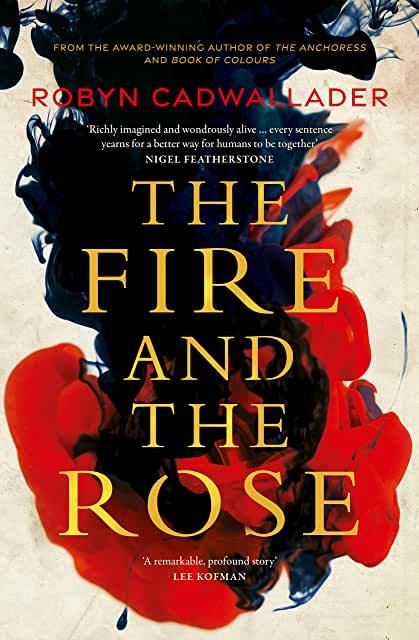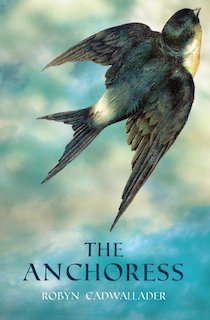Interview with Robyn Cadwallader - Author of ‘The Fire and The Rose’
Interview with Robyn Cadwallader - Author of The Fire and The Rose
Book release May 3rd, 2023 - Publisher HarperCollins Au (4th Estate)
See my book review here.
Please share the inspiration behind The Fire and the Rose.
I first read about the expulsion of the Jews from England when I was doing research for my previous novels. I was horrified, wondering how a complete group of people, settled in a country for over two hundred years, could be summarily told to leave, on pain of death. The more I read, the more I felt that story needed to be told. I also had young Eleanor (from The Anchoress) lingering in my mind. I wondered how a young girl with the skill to read and write would fare in a small village. Would she stay or move on? Happily, those two thoughts found their way together in my novel.
Did this novel require new research or did you draw more upon your own past studies? Were you comfortable writing about the 1200’s? If so, why?
It did require new research, and lots of it! The research I had undertaken for my PhD, and then for my previous two novels, gave me a strong grounding in the twelfth and thirteenth centuries, but for The Fire and the Rose, I needed to investigate the structures of money lending, wool sales, the contemporary politics, the medieval culture of Anglo Jewry, their legal and social position; the church’s attitudes and teaching about Judaism and conversion; the story of Little St Hugh. The list goes on!
The research was fascinating, and I’m always inclined to do a lot, possibly more than I need. But the advantage is that it all helps to make me so familiar with the time, so immersed in it, that I begin to feel the setting from the ‘inside’, and avoid the tendency to exposition.
What is the importance of your setting, Lincoln? Why did you choose this location?
I chose Lincoln because, by the mid-thirteenth century, the number of Jews living there was second only to London. When I first visited, still wondering whether it would be better to set the novel in London, I was drawn to the medieval parts of the city, the hill and the stones, especially.
Describe in 3 words each: Eleanor and Asher. And their connection to each other in one line.
Oh, a hard question! Eleanor: impetuous, determined, curious. Asher: gentle, strong, faithful.
Eleanor and Asher are drawn to one another through the power of words and intense physical attraction, but through hardship, struggle, humour, and their daughter, their love deepens into a bond that will not be broken.
Can you explain Eleanor’s thoughts that she is: “Weary of men who want to control her.” Is this frustration a reflection of the times?
Eleanor’s struggle with the ways in which men control the lives of women is a result of the social, political, and religious structures of the time. Men control money, business, politics and the church. It was not unusual for women to have skills and to work alongside their husbands but, however talented they were, they usually worked from home, behind the scenes, while men went out into the world for business. Eleanor is a woman alone and with a child, earning her own living, Though she is certainly not the only woman to do so in this period, she necessarily butts up against the structures of the period. It is worth noting, also, that Jewish women were often money lenders, some very powerful and successful.
However, Eleanor’s struggle is not confined to the Middle Ages, and similar issues are present today. I hope that reading about such stark examples of control, we might see more clearly the kinds of structures that impact us all, men and women, today.
There are some powerful and moving scenes with the Jewess Marchota. Tell us a little about her and her part/importance in the lives of Eleanor and her daughter Hannah.
Marchota is a widow whose husband, Copin was hung on the king’s order, accused of torturing and killing a young boy, Hugh, in a Jewish religious ritual. Rumours in Lincoln at the time accuse Marchota of having lured the boy into her house, and handed him over to the Jewish men for their ceremony. She has remained in Lincoln, despite verbal and physical attacks, and she becomes a significant support for Eleanor and her daughter.
Marchota faces squarely the hardship of her life, and she refuses to let the judgements of others dominate and direct her decisions and actions.
The story of Hugh has journeyed into folktale and song, often with the woman who lured him depicted as a green faerie. In the novel, I’ve played with the idea that the seeds of that image might have been sown in Marchota’s lifetime —wickedness and deception ascribed to a woman for what is actually an innocent preference for colour. Story, as I suggest elsewhere in the novel, can be both life-giving and destructive.
How long did it take you to write The Fire and the Rose? Was it a long process? A difficult or easy one?
In total, it was five years to take the novel from beginning research (just after Book of Colours went to the printer) to publication. I did a lot of research, as I mentioned. I experimented with time frames when I began writing, until I settled on one that would work. I’m not a methodical writer, and I don’t plan. I don’t write from beginning to end, but I tend to jump around as ideas come. I wrote ten drafts, but I revised a lot within each draft as well, as ideas came. It’s all a bit messy, finding order in the chaos!
A writer walks a mile in each of their character’s shoes while writing them but which one did you identify with the most and what was it about them that made you feel a kinship or connection?
This is such an intriguing question! I think I travelled most closely with Eleanor because she is the protagonist and I was writing in close third person, so feeling my way inside her head. I identified with her love of words and sound and stories. There were times in the writing, though, when she took me by surprise and derailed my assumptions about where her story would go. It was scary, and a couple of times I wondered just what would come next. But I loved that, too, because it showed me that, as a character, she wasn’t limited by my ideas.
I must say, though, that I identify with Asher’s quiet stillness. I’m not entirely like him, but I understand his love for Eleanor and his willingness to remain with her, despite the dangers and threats.
There was a lot of religious prejudice / injustice in the 1200s, which grievance upset you the most that you focused on in your novel?
It’s difficult to choose one because they were all so awful: arrests, hangings, enforced attendance at sermons, casual racism and more, but the story of Little St Hugh is the one that I felt most strongly. Accusations and stories linger in a place, and I realised that the story of a tortured child would remain as a source of prejudice long after the discovery of the boy’s body, so I explored its ramifications among the populace. I also wanted to explore the motivations of the church in developing and using the story for its own purposes and advancement.
There’s beautiful poetry at the beginning of many chapters titled The Walls Speak. The concept that many of us poets and writers dream about: ‘if the stones could speak what would they say of all they have seen and heard’ certainly shines through this novel. Feel free to express more on this topic and how you used this in your narrative.
Thank you! I’m glad you, as a poet, enjoyed the poems. I’ve always thought of stones having a kind of living presence, and the idea for the walls speaking began when I was in the old parts of Lincoln where the streets, houses, castle, cathedral and remaining walls are stone. The Romans, of course, began that building, and I realised that the walls would have seen so many changes in population, culture and leaders. I decided to allow them to speak as a liminal presence, overlooking both inside and outside, a witness, and kind of Greek chorus. The biblical quotations from both Old and New Testament that I quote in the epigraph refer to the same idea, so it seemed especially fitting for a novel where Jews are persecuted and expelled, and where memory is vital.
I wrote the Walls first in a medieval poetic form and voice, but was unhappy with it. Once I realised the Walls couldn’t be limited to a time period, and listened to their age-old voice, the poetry loosened up and began to ‘breathe’. I very much enjoyed playing with words in these sections.
Please provide a short burst on your publishing history. Have you always wanted to be a writer or did an event, book, author/teacher, or something else spark the interest?
I always wanted to write, but doubted my own abilities. Eventually, through personal journaling and then poetry, I began to write. When a few poems were published, and then a book of poems, I slowly began to believe. After reading about anchoresses when writing my PhD, I was intrigued and wanted to explore more, so I embarked on a novel that became The Anchoress.
If you could time travel to the past and spend a week, when and where would you go and who (an important figure) would you want to meet? What two questions would you ask them?
I would like to meet lots of people!
I would like to meet Jeanne de Montbaston who was an illuminator in Paris in the fourteenth century, working with her husband (part of the inspiration for Gemma in Book of Colours). I would ask her how she feels about her work and life, and I would ask her to talk about the bawdy paintings in the margins of religious texts. I think she would be a fabulous woman!
I would love to visit Vincent van Gogh, and I think I’d only ask him if I could stay with him for a few days and watch and listen. I would ask if I could give him a hug.
Name three or four recent published novels you read that you would highly recommend?
Claire Keegan, Small Things Like These I loved; it’s a small gem, a masterpiece.
Jessica Au, Cold Enough for Snow is beautifully controlled, subtle, and cleverly written.
Ursula le Guin, Lavinia so cleverly plays with Lavinia’s silence in The Aeneid, though leaders battle for her hand. The narrative is slow in places, but I loved Lavinia’s conversations with Virgil, the poet who has both written her story, and has not yet written it.
Are you working on any new projects and can you share a little about them?
I am playing with writing at the moment, finding my way towards what I will write next.
Thanks to Robyn for being my guest author! It has been a pleasure discussing some of the insightful aspects of her beautiful novel. I hope many will pick up a copy of The Fire & The Rose and see the wonder in her words.
Visit Robyn’s website for more information on her books, writing and where to connect with her on social media.



